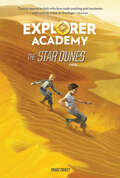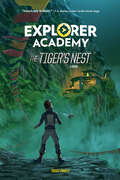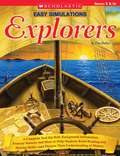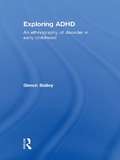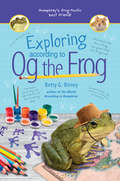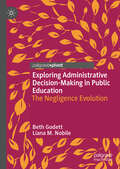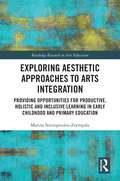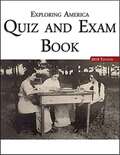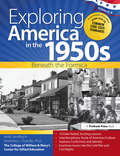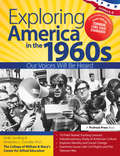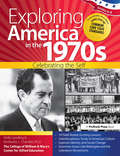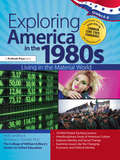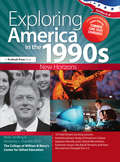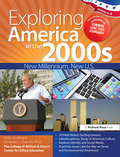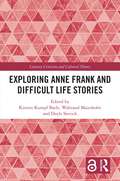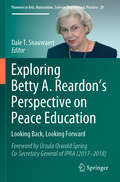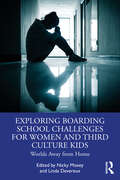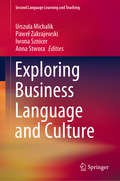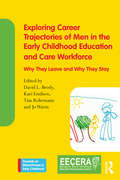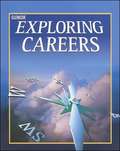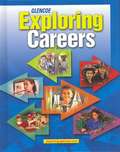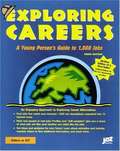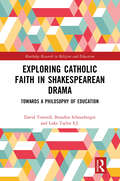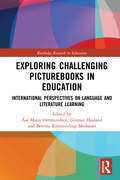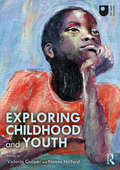- Table View
- List View
Explorer Academy: The Star Dunes (Explorer Academy)
by Trudi TrueitCruz, Sailor, Emmett, and the gang are on their way to Africa when Nebula misses their intended target and someone close to Cruz ends up on the brink of death. Secrets creep out from the shadows and leave Cruz with more questions than answers in this fourth title in the hit series.A major discovery forces the Explorer Academy into the limelight in The Star Dunes, but Cruz has much more on his mind than 15 minutes of fame. A new face on board the ship brings Cruz's worlds colliding, just as a major close call tears them apart. En route to Africa, Team Cousteau is now down a major player, and Cruz can't help but be preoccupied by the hole in his life. The discovery of his mom's next clue leads him to the most exotic location yet--a vast desert--with no other information to lead the way, while an unlikely ally helps Cruz pursue another piece of the puzzle. Just as things seem like they might turn out alright, Dr. Fanchon Quills has a technological breakthrough which gives Cruz a glimpse into the past and reveals more about his future than he may really want to know.
Explorer Academy: The Tiger's Nest (Book 5)
by Trudi TrueitCruz Coronado and his fellow explorers are jolted from their normal routines at Explorer Academy's classroom at sea and thrust into survival mode as the adventure continues in the fifth book in the thrilling middle-grade fiction series.On an island nation in the Indian Ocean, the explorers venture through a vast underwater world and take part in a friendly robotics competition. But the tides of good fortune change quickly. Suddenly, Team Cousteau jumps into action to rescue a faculty member from the brink of death. Meanwhile, the team follows the Cruz's mother's clues to a magnificent tomb and center of spirituality precariously perched on the side of a cliff. There, Cruz is confronted by a familiar foe who's determined to stop him from completing his most important mission of all: Retrieving the final pieces of his mother's cipher. In this life-or-death showdown, Cruz witnesses the ultimate sacrifice and uncovers a hidden message that makes him question his own mortality.
Explorers: A Complete Tool Kit With Background Information, Primary Sources, And More That Help Students Build Reading And Writing Skills-and Deepen Their Understanding Of History
by Tim BaileyIn this weeklong simulation, students discover what it's like to embark on a voyage across the Atlantic Ocean as an explorer during the tim of Christopher Columbus. Students learn about problem solving, seafaring, and navigation. Includes step-by-step directions, plus reproducible student worksheets, charts, maps, and rubrics. Using simulations is one of the most powerful methods of teaching history. Guaranteed to motivate and engage all students!
Exploring ADHD: An ethnography of disorder in early childhood
by Simon BaileyAttention Deficit Hyperactivity Disorder (ADHD) is the most commonly diagnosed psychiatric condition of childhood worldwide, yet the medical and psychological perspectives that dominate our understandings of ADHD present problems in their reductive understanding of the condition. Exploring ADHD incorporates Michel Foucault’s notions of discourse and power into a critical ethnographic framework in order to analyse ADHD in terms of both the historical conditions that have shaped understandings of the disorder, and also the social conditions which build individual diagnostic cases in today’s schools and families. In this ground-breaking text, Simon Bailey also: acknowledges the necessary work of classrooms, schools and families in contributing to a social order; examines the problem of teacher autonomy and the constraints placed on schools to ‘perform’; describes the role of nurture groups in governing the emotional conduct of children; presents a unique gender analysis of ADHD. This fascinating new book will be of interest to researchers and academics in the field of early childhood education, special and inclusive education, and will illuminate and spark new debate in the arena of ADHD.
Exploring According to Og the Frog (Og the Frog #2)
by Betty G. BirneyIn the second book in the Og the Frog spinoff of the Humphrey series, Og is ready for adventure and is jumping at the chance to help kids be brave!Og loves the kids in Room 26, but he's awfully curious about the human world outside his tank! His friend Humphrey has no problem getting out and about, but it's harder for Og because he can't climb the way a hamster can. But Og never let hard work or fear stop him from going after what he wants. And he's determined to help the tads in Room 26 understand that taking risks can pay off--especially when they are being true to themselves. Whether it's learning that a younger kid can have great ideas, a student who learns differently can have hidden talents, or ideas that seem crazy at first can actually be amazing if you look at them from a different perspective, Og wants everyone to celebrate their talents. And once he fully embraces his frogginess--BING-BANG-BOING--he figures out how to go where no frog has gone before. Og's frog's-eye view of the world is curious, adventurous, and creative, and the perfect companion to Trouble According to Humphrey.
Exploring Administrative Decision-Making in Public Education: The Negligence Evolution
by Beth Godett Liana M. NobileThis book explores the intersections of negligence law in the context of public schooling and school policy. Today’s schools face challenges that could easily, and even unintentionally, create a climate for an increase in negligence-based lawsuits. Vacillating laws and societal expectations force administrators to adjust to changing education paradigms as our traditional model of schooling responds to previously unimagined realities. There is no shortage of public policy demanding administrators’ attention in response to increased gun violence, limitations on what children can read and what teachers can teach, how we refer to ourselves and each other, and more that emerge almost daily. This book defines “Next-Gen Negligence,” placing the tort’s traditional elements in the context of an educator’s current and future practice, elucidating the tremendous implications for education as a profession.
Exploring Aesthetic Approaches to Arts Integration: Providing Opportunities for Productive, Holistic and Inclusive Learning in Early Childhood and Primary Education (Routledge Research in Arts Education)
by Marina Sotiropoulou-ZormpalaThis book re‑examines the role of arts integration in the preschool and primary school curricula, arguing for the creation of an educational environment where children can process every taught subject as an aesthetic stimulus.Deriving from the author’s earlier work, this scholarly volume attempts to develop novel criteria for arts integration curricula, through examining the effects of different indicative arts integration activities implemented in preschool and primary classrooms. Taking a pedagogical approach, chapters enable readers to connect theoretical insights, implementation strategies and corresponding methodological guidelines. Ultimately, this book argues that the aesthetic integration of the arts into the curricula of preschool and primary schools has three distinct, important effects on the educational process: fostering a more creative and productive education through a multilevel approach, creating opportunities for holistic education by enhancing children’s multifaceted learning involvement and promoting multimodal and inclusive education by providing diverse resources of meaning‑making.This book will be of interest to researchers, postgraduate students and academics in the fields of primary education, curriculum studies, teacher education and arts education. Educational policymakers and teacher trainers may also benefit from this volume more broadly.
Exploring America in the 1950s: Beneath the Formica (Grades 6-8)
by Kimberley Chandler Molly SandlingExploring America in the 1950s: Beneath the Formica is an interdisciplinary humanities unit that looks at literature, art, and music of the 1950s to provide an understanding of how those living through the decade experienced and felt about the world around them. Through the lens of "identity," it explores life in America and the myriad groups that coexisted in harmony and, often, with friction. Cultural icons like Elvis and the Beat poets are examined alongside larger issues such as the Cold War, conformity, and Civil Rights struggles. The unit uses field-tested instructional strategies for language arts and social studies from The College of William and Mary, as well as new strategies, and it includes graphic organizers and other tools for analyzing primary sources. It can be used to complement a social studies or language arts curriculum or as standalone material in a gifted program.Grades 6-8
Exploring America in the 1960s: Our Voices Will Be Heard (Grades 6-8)
by Kimberley Chandler Molly SandlingExploring America in the 1960s: Our Voices Will Be Heard is an interdisciplinary humanities unit that looks at literature, art, and music of the 1960s to provide an understanding of how those living through the decade experienced and felt about the many social changes taking place around them. Through the lens of "identity," it explores why these changes occurred and lends an ear to the voices of the groups that clamored for them. Cultural icons like the Kennedys, the Beatles, Andy Warhol, and the Beach Boys are examined alongside larger issues such as the Civil Rights and women's rights movements and the Vietnam War. The unit uses field-tested instructional strategies for language arts and social studies from The College of William and Mary, as well as new strategies, and it includes graphic organizers and other learning tools. It can be used to complement a social studies or language arts curriculum or as standalone material in a gifted program.Grades 6-8
Exploring America in the 1970s: Celebrating the Self (Grades 6-8)
by Kimberley Chandler Molly SandlingExploring America in the 1970s: Celebrating the Self is an interdisciplinary humanities unit that looks at literature, art, and music of the 1970s to provide an understanding of how those living through the decade experienced and felt about the world around them. Through the lens of "identity," it explores life in America and the myriad groups that coexisted in harmony and, often, with friction. Cultural movements like disco and the punk are examined alongside larger issues such as Watergate, post-Vietnam stagflation, and the birth of the women's liberation, Chicano, and gay pride movements. The unit uses field-tested instructional strategies for language arts and social studies from The College of William and Mary, as well as new strategies, and it includes graphic organizers and other tools for analyzing primary sources. It can be used to complement a social studies or language arts curriculum or as standalone material in a gifted program. Grades 6-8
Exploring America in the 1980s: Living in the Material World (Grades 6-8)
by Kimberley Chandler Molly SandlingExploring America in the 1980s: Living in the Material World is an interdisciplinary humanities unit that looks at literature, art, and music of the 1980s to provide an understanding of how those living through the decade experienced and felt about the many social changes taking place around them. Through the lens of "identity," it explores why these changes occurred and lends an ear to the voices of the groups that clamored for them. Cultural icons like Madonna and Bill Cosby are examined alongside larger issues such as the end of the Cold War and a changing economic and political identity. The unit uses field-tested instructional strategies for language arts and social studies from The College of William and Mary, as well as new strategies, and it includes graphic organizers and other learning tools. It can be used to complement a social studies or language arts curriculum or as standalone material in a gifted program.Grades 6-8
Exploring America in the 1990s: New Horizons (Grades 6-8)
by Kimberley Chandler Molly SandlingExploring America in the 1990s: New Horizons is an interdisciplinary humanities unit that looks at literature, art, and music of the 1990s to provide an understanding of how those living through the decade experienced and felt about the world around them. Through the lens of "identity," it explores life in America and the myriad groups that coexisted in harmony and, often, with friction. Cultural movements like grunge and Generation X will be examined alongside larger issues such as rising racial tensions following the O.J. Simpson trial and Rodney King riots, the conflict between progress and morality as scientific advances in cloning and the Internet changed the U.S., and the growing debate over previously marginalized identities and gay rights following "Don't Ask, Don't Tell" and DOMA. The unit uses field-tested instructional strategies for language arts and social studies from The College of William and Mary, as well as new strategies, and it includes graphic organizers and other tools for analyzing primary sources.Grades 6-8
Exploring America in the 2000s: New Millennium, New U.S. (Grades 6-8)
by Kimberley Chandler Molly SandlingExploring America in the 2000s: New Millennium, New U.S. is an interdisciplinary humanities unit that looks at literature, art, and music of the 2000s to provide an understanding of how those living through the decade experienced and felt about the world around them. Through the lens of "identity," it explores life in America and the myriad groups that coexisted in harmony and, often, with friction. Cultural movements like the rise of social media and the advancements of minorities are examined alongside larger issues such as 9/11 and its profound effect on American identity, our redefined role in the War on Terror, increasing environmental awareness, and economic recession and corporate struggles. The unit uses field-tested instructional strategies for language arts and social studies from The College of William and Mary, as well as new strategies, and it includes graphic organizers and other tools for analyzing primary sources.Grades 6-8
Exploring Anne Frank and Difficult Life Stories (Literary Criticism and Cultural Theory)
by Kirsten Kumpf Baele Waltraud Maierhofer Doyle StevickThis volume, grounded in the Diary of a Young Girl and its continued appeal to readers of all ages, sees both promise in the relevance of Anne Frank’s story in the twenty‑first century, and potential for new ways of teaching her story and those of other genocides and human right violations. Engaging Anne Frank with these other cases clarifies the distinct nature of the Holocaust, and we build on the fact that the diary touches areas of deep interest, especially to young people, and that it has been read as a monument to resisting hate, which is itself a prerequisite for educating citizens of more diverse and inclusive societies. The diverse contributions and viewpoints in this volume illustrate how rich the ongoing engagement with Anne Frank and her legacy remain.
Exploring Betty A. Reardon’s Perspective on Peace Education: Looking Back, Looking Forward (Pioneers in Arts, Humanities, Science, Engineering, Practice #20)
by Dale T. SnauwaertThis book presents commentaries by a leading international group of peace education scholars and practitioners concerning Reardon’s peace education theory and intellectual legacy. The guiding question throughout the book is: How can her foundational work be used to advance the theory and practice of peace education? In an attempt to find answers, the contributing authors explore three general areas of inquiry: (1) Theoretical Foundations of Peace and Human Rights Education; (2) Feminism and the Gender Perspective as Pathways of Transformation Toward Peace and Justice; and (3) Peace Education Pedagogy and Practices. A contemplative commentary by Reardon herself rounds out the coverage
Exploring Boarding School Challenges for Women and Third Culture Kids: Worlds Away from Home
by Nicky Moxey Linda DevereuxThrough personal testimonies, this book offers insights into the boarding school experiences of women and third culture kids (TCKs), examining the particular challenges for those who are sent away from their families and all that is familiar to board in a country that feels worlds away from home.The stereotype of expatriate families is of glamorous lives lived in exotic locations with access to wealth and privilege. However, many of these families feel pressure to send their children ‘home’ to boarding school in their passport country without understanding the long-term implications of this choice. This book explores such long-term effects, starting with laying an accessible theoretical framework for the reader by drawing on scholarship from the fields of psychology, the study of TCKs, and the growing understanding of adverse childhood experiences (ACEs). The text then moves into the personal testimonies of 16 individuals, most of whom are TCKs or cross-cultural boarders, shedding light on the particular challenges they’ve faced. The book ends by offering hope and help with chapters providing insights and practical strategies for supporting those affected by boarding school.This user-friendly, accessible volume will appeal to professionals working with transcultural boarders, ex-boarders, or those who are considering sending their own children to boarding school.
Exploring Business Language and Culture (Second Language Learning and Teaching)
by Paweł Zakrajewski Urszula Michalik Iwona Sznicer Anna StworaThis book aims to present the results of research in the sphere of business language and culture, as well as the experience of pedagogical staff and practitioners concerned with broadly understood business. The highly complex nature of contemporary business environment, approached from both the theoretical and practical standpoint, does not cease to prove that research into business studies cannot be dissociated from the cultural and linguistic context. The chapters included in this book were contributed by academics and practitioners alike, which offers a balanced approach to the topic and ensures high levels of diversity together with an undeniable homogeneity. They were gathered with a view to show various aspects of business language, perceived both as a medium of communication and as a subject of research and teaching. They are concerned with business culture as well, including business ethics and representations of business in popular culture. Owing to its multidisciplinary approach, the book presents a roadmap towards successful functioning in business settings, highlighting such issues as education for business purposes, the study of language used in business contexts, the aspects of cross-cultural communication, as well as ethical behaviour based upon different values in multicultural business environments. Given its multifarious character, the book surely appeals not only to academics, but also to the interested laymen and students who wish to expand their knowledge of business studies and related phenomena.
Exploring Career Trajectories of Men in the Early Childhood Education and Care Workforce: Why They Leave and Why They Stay (Towards an Ethical Praxis in Early Childhood)
by Jo Warin David L. Brody Kari Emilsen Tim RohrmannThe role of men in early childhood education and care is crucial for the future of all children growing up in a gender sensitive world. Achieving greater diversity and gender balance in the workforce has proved a challenging goal, despite concerted efforts on the part of individuals, institutions, and governments around the world. Many men remain reluctant to enter the profession, and once they choose this work many leave. This book explores how men in the field make their career decisions to remain in or leave the profession. Taking a broad international perspective and exploring the role of gender in these career decisions, contributors from around the globe unpack how gender concepts influence men’s career trajectories. Through their collaborative research, the team of 17 gender and early childhood researchers investigate various critical and relevant factors such as professionalisation, workplace environment, leadership, day to day interactions in the workplace, societal considerations, internal motivations, agency, masculinities, and critical moments in career decision making. Using cultural, racial, ethnic, and social class lenses to examine men’s career decisions over their professional lives, the contributors’ unique approach uncovers the complexity of the issue and offers evidence-based recommendations for policy both on national and local levels. These include practical suggestions to directors and managers who care about achieving a gender-mixed workforce. Accessible and enlightening, this is a unique resource for scholars, policymakers, and any others in the education community who support boosting the inclusion of men in early childhood education.
Exploring Careers (3rd Edition)
by Joan Kelly-Plate Ruth Volz-PattonThis completely revised middle school career education program, formerly titled Career Skills, motivates your students to investigate career opportunities they might pursue in the future.
Exploring Careers (4th edition)
by Joan Kelly-Plate Ruth Volz-PattonThis text prepares students for the rapidly changing opportunities in the world of work. As they explore each of the 16 U. S. Department of Education career clusters, they'll build foundation skills and workplace competencies as they learn how each new skill can help them build successful careers. Attractive visuals and an easy-to-read style invite students of all backgrounds and abilities to explore the content.
Exploring Careers: A Young Person's Guide to 1,000 Jobs - Third Edition
by Lon Gates Hand Veda Dickerson Rodme L. Dobeck Stephanie Koutek Lisa S. WilliamsEvery day you see adults all around you on their way to work. What do they do all day? More importantly, what job will you do someday? That's a big question. Your career choice will affect your happiness, your lifestyle, and your earnings. Through a unique mix of interesting information, Exploring Careers helps you learn more about the jobs that match your interests, favorite courses, free-time activities, and skills. IT'S EASY* Exploring Careers is divided into 14 interest areas. Just select the areas that interest you most and learn more about related careers through real-life worker profiles, samplers of key job skills, and brief job descriptions. IT'S REAL.. Read 49 interesting profiles of real people doing real jobs. Learn what they do, how they got into their fields, the education and training they had, what they like and sometimes don't like about their work, and much more. IT CONNECTS TODAY TO YOUR FUTURE. In 19 skill samplers, real workers tell you about the skills they need for their jobs. Questions help you see how what you're good at today could lead to a future job. IT'S QUICK BUT COMPLETE* Learn current facts about 1,000 jobs. Each brief description includes information about education and training needed, average salary, job growth, and the importance of math, science, and English to the job. Meets National Career Development Guidelines for Self-Knowledge, Educational and Occupational Exploration, and Career Planning.
Exploring Catholic Faith in Shakespearean Drama: Towards a Philosophy of Education (Routledge Research in Religion and Education)
by David Torevell Luke Taylor Brandon SchneebergerThis pioneering study investigates the connection between Shakespeare and Catholic education. Its authors contend that Shakespeare’s plays explore Catholic understandings of human life in ways that remain relevant for Catholic educational institutions today.Through chapters focusing on ethical and existential themes – love, desire, the body, marriage, virginity, evil, finitude, jealousy, and lies – the authors demonstrate Shakespeare’s wide-ranging engagement with early modern Catholic belief and practice. At the same time, they argue that Shakespeare’s treatment of Catholic faith, through imaginative literature rather than magisterial discourse, and dramatically rather than didactically, provides a pedagogical model for contemporary teachers.The first volume to trace the relationship between a philosophy of Catholic education and Shakespearean drama, it will appeal strongly to all those working in Catholic educational settings, particularly those tasked with strengthening the mission of their institution, as well as to scholars and researchers of literacy education, religious education, and to those interested in the dynamic between education and drama.
Exploring Challenging Picturebooks in Education: International Perspectives on Language and Literature Learning (Routledge Research in Education)
by Åse Marie Ommundsen; Gunnar Haaland; Bettina Kümmerling-MeibauerWhat should children and students read? This volume explores challenging picturebooks as learning materials in early childhood education, primary and secondary school, and even universities. It addresses a wide range of thematic, cognitive, and aesthetic challenges and educational affordances of picturebooks in various languages and from different countries. Written by leading and emerging scholars in the field of picturebook studies and literacy research, the book discusses the impact of challenging picturebooks in a comprehensive manner and combines theoretical considerations, picturebook analyses, and empirical studies with children and students. It introduces stimulating picturebooks from all continents and how they are used or may be used in educational settings and contexts. The chapters touch on subjects like reading promotion, second-language acquisition, art education, interdisciplinary learning, empathy development, minority issues, and intercultural competence. Moreover, they consider relevant aspects of the educational environments, such as the inclusion of picturebooks in the curriculum, the significance of school libraries, and the impact of publishers. Exploring Challenging Picturebooks in Education sheds new light on the multiple dimensions relevant to investigating the impact of picturebooks on learning processes and the development of multimodal literacy competencies. It thus makes a significant contribution to the growing area of picturebook research and will be key reading for educators, researchers, and post-graduate students in the field of literacy studies, children’s literature, and education research.
Exploring Childhood and Youth
by Naomi Holford Victoria CooperThis exciting new book illustrates and analyses the complexities of children's and young people’s everyday lived experiences throughout childhood. Taking an interdisciplinary approach, it provides theoretical frameworks and case studies to critically examine assumptions in the field and explore emerging perspectives. Considering different stages throughout childhood and youth, chapters cover key topics such as eating practices, gender, play, digital media and the environment. Drawing upon insights from cultural studies, sociology, social anthropology, psychology, health and education, this book focuses on four key areas: Bodies and minds Space, place and belonging Inequalities and inclusion Childhood in the past, present and future Essential reading for students on childhood and youth and education courses, Exploring Childhood and Youth is an important resource for practitioners working with children and young people, and for parents, communities and legislators who have influence over children’s and young people’s lives.
